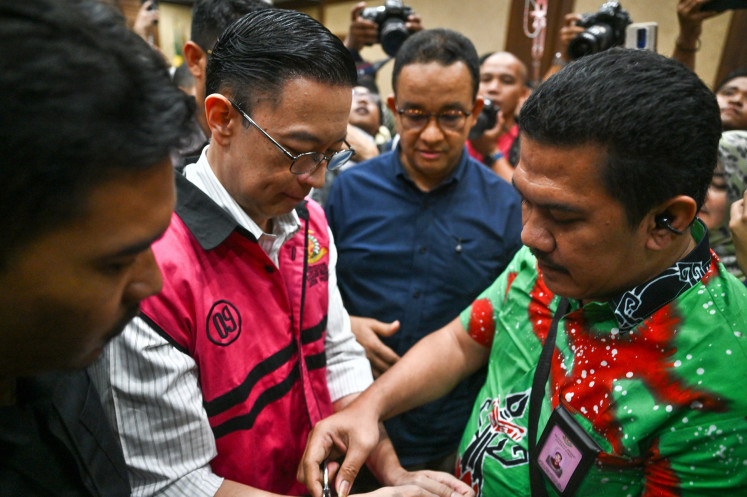Popular Reads
Top Results
Can't find what you're looking for?
View all search resultsPopular Reads
Top Results
Can't find what you're looking for?
View all search resultsRestoring public trust in Corruption Courts
Painstaking efforts to combat corruption in Indonesia remain far from satisfying
Change text size
Gift Premium Articles
to Anyone
P
ainstaking efforts to combat corruption in Indonesia remain far from satisfying. Recently a number of regional corruption courts look to have been keeping up with the Joneses as they acquitted graft defendants, including those prosecuted by the Corruption Eradication Commission (KPK).
In a show of frustration, Constitutional Court chief justice Mahfud MD called for the dissolution of the regional courts. His controversial appeal was later echoed by new Law and Human Rights Minister Amir Syamsuddin.
Mahfud’s reaction seems justified. The Indonesia Corruption Watch (ICW) reported that regional corruption courts across the country have exonerated 40 defendants. The latest case was the corruption court in Samarinda, East Kalimantan, which found 14 Kutai Kartanegara legislative council members not guilty of embezzling Rp 2.98 billion (US$334,000) from the regional budget.
The acquittal spree has cast doubts over not only the capability and integrity of officials within the justice system but also the course of the country’s war on corruption. Previously the corruption courts, along with the KPK, were regarded as the vanguards of the nationwide struggle against graft.
There is a real worry that the quality of local tribunals is diminishing. In the worst case scenario, the acquittals could rekindle the dreams of corrupt officials and others so inclined of swindling state funds by ever more cunning but subtle means. As a consequence, the public would easily come to regard the corruption courts as places of transaction in which the legal mafia and fraudulent officials —the police, prosecutors and judges — work hand-in-hand.
The public loss of trust in the war on corruption would be disastrous considering the tendency of people to take the law into their hands in their search for justice. Rather than bringing graft suspects to trial, citizens might decide to mete out justice as they see fit without due recourse to law enforcement agencies or the courts. Chaos and instability would then be inescapable.
In spite of the strong demand, however, calls for the dissolution of regional corruption courts are impractical. Handing over all major bribery cases to the Corruption Court in Jakarta would only result in a massive backlog that would take years or decades to clear, giving graft suspects plenty of time to sneak out of the country with their ill-gotten gains. Not to mention soaring court administrative costs and greater inefficiency.
The ideal solution to the current proliferation of graft courts manned by hastily selected judges is to set up just a handful of courts and manage them just as stringently as the one in Jakarta. It would be better to have one court on each of the five main islands —Sumatra, Kalimantan, Sulawesi, Java and Papua.
Furthermore, we need to have closer monitoring of the courts and their judges and a better system for the recruitment of judges. It is evident that the courts’ weakness is the poor method of recruitment with regard to potential judges’ integrity. Based on the Judicial Commission’s observation of the recent acquittal involving the Bandung Corruption Court, it seems that the court’s integrity was compromised because one of the ad hoc judges had himself previously been convicted, though later acquitted on appeal, of corruption in Pekanbaru.
It could be the recruitment system is flawed because the Supreme Court, which appoints judges, lacks the time to screen candidates. The Supreme Court should involve the Judicial Commission in improving the system. For that purpose, an amendment to the law on judicial authority is imperative and should recognize the Judicial Commission’s involvement in the selection process so that it can generate more competent and qualified judges.
In such a state of emergency, intensive monitoring is a must, including wiretapping miscreant judges. It may work, for instance, as the Judicial Commission uses its regional network. The case of convicted Central Jakarta Commercial Court judge Syarifudin Umar, who was under surveillance for three years, suggests that monitoring crooked judges is not something that can be done overnight.
We call for highly qualified judges who rule their courts not just with their minds but also their hearts. They must exert both legal and moral authority to regain public respect. They will have to resist pressure and temptation from all sides, which is no easy task given the history of political intervention in the judicial system.
The country’s judiciary is not just an arm of a democratic state but also a pillar of society. While carrying out their duties, judges should be mindful of not only their responsibilities but also the public’s perception formed by their actions or deeds.
The writer, a graduate of the University of Canberra, Australia, is a lecturer at Andalas University, Padang.










